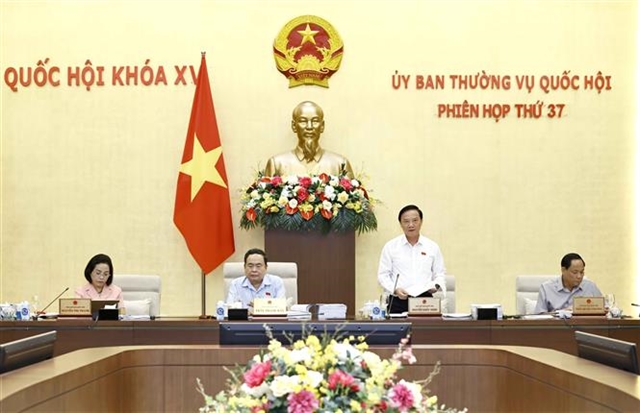 Politics & Law
Politics & Law

 |
| National Assembly Vice Chairman Nguyễn Khắc Định delivers a speech at the NA Standing Committee's 37th session on Wednesday. VNA/VNS Photo Doãn Tấn |
HÀ NỘI — More people could be eligible for health insurance, which could be expanded to cover more conditions, following discussions at the National Assembly (NA).
Deputies at the NA's Standing Committee on Wednesday recommended that a study is made on who is eligible for insurance and for what kinds of medical treatments, while discussing the amended Law on Health Insurance.
At their 37th session, NA deputies recommended a comprehensive assessment of the impact of expanding eligible groups to ensure the law's feasibility, fairness and sustainability of the health insurance fund.
The draft law proposed amendments to 40 provisions, covering aspects such as eligibility for health insurance, payment responsibilities, benefits, scope of coverage, organisation of medical services, fund management and various technical regulations.
The law's revisions aim to address urgent issues in the current legislation and provide comprehensive information and data to secure consensus.
One key amendment includes transitioning from a four-tier healthcare system to three levels of medical specialisation, effective from January 1, 2025, to coincide with the implementation of the Law on Medical Examination and Treatment.
In its preliminary review of the draft law, the NA’s Social Affairs Committee stated that it generally agrees with expanding the eligible groups for health insurance, as it aligns with related legal frameworks such as the Law on Social Insurance and the Law on Militia and Self-Defence Forces.
However, the committee emphasised the need for a detailed evaluation of the impact of expanding groups whose insurance is paid for or subsidised by the state budget, as well as those covered by employers.
Additionally, the drafting body was urged to continue reviewing current legislation to ensure all eligible groups are adequately represented in the health insurance system.
The standing committee agreed with the amendment to Article 32 regarding the advance payment, settlement and reimbursement of health insurance costs as outlined in the draft law.
However, some opinions noted that the current pressing issue in the settlement of health insurance payments is the assessment of the reasonableness of medical services during insurance audits.
Disputes often arise between the auditing bodies and healthcare facilities over the justification for services provided, leading to delays in payment settlements.
During the session, NA Chairman Trần Thanh Mẫn emphasised that the urgent concern is ensuring the timely payment and reimbursement of healthcare costs under health insurance and securing access to necessary medications for patients.
These issues are largely tied to the organisation of healthcare services, management and the auditing and payment processes.
Highlighting the importance of medical ethics, NA Chairman Mẫn urged fairness, ensuring no discrimination between patients receiving private medical services and those covered by health insurance.
He also supported the expansion of health insurance coverage, but stressed the need for careful review to ensure fairness and that no one loses benefits compared to the current system.
Particular attention, he noted, should be given to vulnerable groups, including veterans, ethnic minorities, residents in remote areas, the elderly and those affected by natural disasters.
Additionally, while expanding benefits for health insurance participants is a humanitarian policy, it must be feasible, equitable and sustainable in terms of the health insurance fund.
NA Secretary-General and Chief of the Office Bùi Văn Cường added that the draft law more clearly defines violations such as late or non-payment of health insurance, which is necessary to strengthen enforcement. However, he suggested reviewing these provisions to ensure alignment with the newly-passed 2024 Law on Social Insurance, as both health and social insurance collections are managed by the same agency.
Teachers examined
On the same day, the NA Standing Committee also reviewed the draft Law on Teachers.
Deputy Minister of Education and Training Phạm Ngọc Thưởng stated that the draft law consists of nine chapters and 71 articles, detailing five key policies previously approved by the Government. These include defining teachers, their titles and standards required, recruitment, employment and working conditions, training, development, remuneration and recognition and State management of teachers.
The committee agreed on the need to empower teachers effectively but suggested that the drafting body further refine and specify educators' rights appropriately.
The committee also emphasised the importance of policies to support and attract teachers, while recommending a thorough assessment of the policies' impact. Some members proposed reviewing existing support and incentive policies to avoid overlap or exclusion.
They also recommended introducing policies to attract top-performing students to pursue teaching degrees and to retain outstanding graduates as university faculty. — VNS